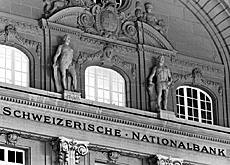Swiss inflation rate drops to zero

Inflation in Switzerland fell to zero in February, the lowest level in three years, according to figures released on Thursday.
Consumer prices rose by 0.2 per cent from January, largely due to higher rents, but remained unchanged when compared with February last year, the Federal Statistics Office said.
Although there is no current pressure on prices, economists believe the Swiss National Bank (SNB) may still continue to increase interest rates gradually.
The inflation figure was the lowest yearly rate since March 2004, when prices fell 0.1 per cent on the year.
On a year-on-year comparison, prices for domestic goods increased by 0.9 per cent while imported products declined 2.3 per cent, the Statistics Office said.
It noted that although the price for heating oil had risen by three per cent compared with January, it was still ten per cent cheaper than a year ago.
Fuel prices went down by 1.7 per cent compared with January and by 4.8 per cent compared with February last year.
Little price pressure
Analysts said neither the strong economy nor the weak franc had fuelled inflation so far and there was little price pressure on the horizon.
“The imported goods component [in the figures] fell, so we don’t see much of a follow-through of higher import prices to consumer prices,” commented Thomas Hermann at Credit Suisse.
He added that this weakened the SNB’s case that the weak franc could lead to strong inflationary pressure.
Bank officials had repeatedly warned that the weak franc could push up inflation because it made imports more expensive.
Analysts believe the SNB will increase interest rates even though surveys, lower input price input price inflation and the SNB’s own gauge for underlying price pressures have signalled little short-term inflationary pressure.
“The SNB has pointed out that the short-term inflation outlook is very positive and has emphasised medium to long-term risks,” Thomas Herrmann from Credit Suisse commented.
The bank has said rates had to rise to fend off risks to price stability in the longer run.
Analysts therefore feel the bank will next week announce a 25 basis point rise in its key interest rate, which currently stands at two per cent. Most say another increase will follow later this year.
swissinfo with agencies
The SNB in December raised the target range for its key interest rate – to 1.5%-2.5%, aiming for the midpoint of 2%.
In September, it had raised the target range to 1.25%-2.25%, aiming for 1.75%.
The primary goal of the Swiss National Bank is price stability, which it considers an important condition for growth and prosperity.
The SNB equates price stability with a rise in the national consumer price index of less than 2% a year.
Monetary policy decisions are made on the basis of an inflation forecast and implemented by steering the three-month Libor (London Interbank Offered Rate).
The Libor designates the interest rates fixed every business day by the British Bankers’ Association.
These are the rates at which major banks are prepared to grant unsecured money market loans to each other.

In compliance with the JTI standards
More: SWI swissinfo.ch certified by the Journalism Trust Initiative












You can find an overview of ongoing debates with our journalists here . Please join us!
If you want to start a conversation about a topic raised in this article or want to report factual errors, email us at english@swissinfo.ch.